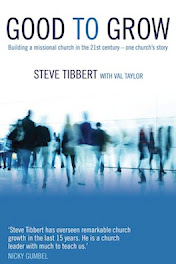Tuesday 30 June 2009
A person with vision or a visionary person?
- A person with vision talks little but does much.
- A visionary person does little but talks much.
- A person with vision finds strength from inner convictions.
- A visionary person finds strength from outward conditions.
- A person with vision continues when problems arise.
- A visionary person quits when the road becomes difficult.’
From Developing the Leader within You – John Maxwell
Friday 26 June 2009
Maxwell on Vision
‘My observation over the last twenty years has been that all effective leaders have a vision of what they must accomplish. That vision becomes the energy behind every effort and the force that pushes through all the problems. With vision, the leader is on a mission and a contagious spirit is felt among the crowd until others begin to rise alongside the leader. Unity is essential for the dream to be realised. Long hours of labour are given gladly to accomplish the goal. Individual rights are set aside because the whole is much more important than the part. Time flies, morale soars upward, heroic stories are told, and commitment is the watchword. Why? Because the leader has a vision!’
Tuesday 23 June 2009
Guidance : final principle
Paul’s life was soaked in God’s word. He applied it to himself and it was a source of continual reference and his compass for ministry. In Psa 32:8 God says ‘I will instruct you…’ – we must put ourselves in a context where we can study and hear the word of God, both in our personal reading and in listening to biblical preaching. There’s no way to short-cut through this important process! Paul drew on his knowledge of God’s word for guidance on leadership and ministry decisions.
Friday 19 June 2009
Guidance : further principles
3. The counsel of others
Tuesday 16 June 2009
Guidance : Principles
Looking at Acts 16, John Stott encourages us again, ‘some important principles of divine guidance are, in fact, exemplified in the experience of Paul and his companions’.
- discern the meaning, find the interpretation
- work out what to do as a result – the application
Friday 12 June 2009
Guidance : it's the moving ship that gets steered!
As leaders, when our wishes and God’s guidance coincide we are quick to rejoice and praise Him! When we are thwarted we can become downhearted and can attribute events as signs of opposition and/or ‘the enemy’s work’. Truth is – it’s more likely to be God’s activity and we need to maintain an attitude of praise and worship in all circumstances.
Tuesday 9 June 2009
Guidance : disagreements and closed doors
God’s promise is that He will guide us (Psa 32:8) and an examination of the book of Acts shows us how this happened at significant times in the life and development of the early Church. The prelude to Acts 16 was a disagreement between Paul and Barnabas that led to them going their separate ways. One result of this is that the young Timothy joined Paul’s apostolic team – a significant addition came from a negative situation. As they travel on, reversing the itinerary of the first missionary journey they had made previously, they seem to meet nothing but ‘closed doors’.
Friday 5 June 2009
Guidance: Use the Force!
If only guidance was that easy! (My brother and I once played a very interesting game of cricket where I decided to bat with my eyes shut and ‘trust the force!’…) The fact is that in wanting to serve God, follow Him and be in His will, we need to learn to hear from God.
There are important decisions to be made in life – significant relationships and marriage, having children, allocating time where demands are increasing, career and job development, where to live, spending money, buying possessions – among others. In leadership, the consequences of our decisions can be even more far-reaching, both for ourselves and also for the churches we serve.
In the next few blogs I will look at guidance and some principles that I have found helpful. One of my greatest leadership decision moments was related to the first building project we undertook here at King’s in year 2000. It was whether we should sell an old church building to the Jehovah’s Witnesses!
Tuesday 2 June 2009
From Developing the Leader Within You: John Maxwell - 4
My top ten tips for personal organisation.
1. Set your priorities
2. Place priorities in your calendar
3. Allow a little time for the unexpected
4. Do projects one at a time
5. Organise your work space
6. Work according to your temperament
7. Use your driving time for light work and growth
8. Develop systems that work for you
9. Always have a plan for those minutes between meetings
10. Focus on results, not the activity






